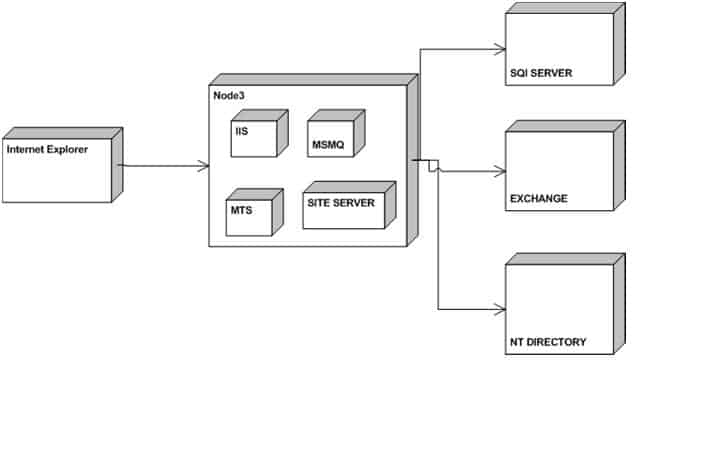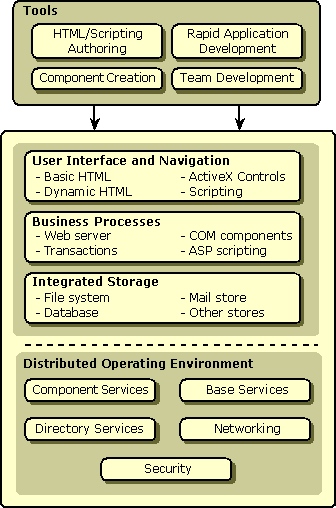Microsoft Windows Distributed interNet Applications (DNA) Architecture was a framework introduced by Microsoft in the late 1990s, specifically around 1999. It was designed to help developers create distributed, multi-tier applications that are scalable, reliable, and easy to maintain. Windows DNA was built on a variety of Microsoft technologies, including COM (Component Object Model), DCOM (Distributed COM), and later COM+, as well as other technologies like Microsoft Transaction Server (MTS) and SQL Server.
Table of Contents:
- What was the Windows DNA Architecture?
- How it Worked
- Relevance and Decline
- Transition to .NET Framework and Current Usage
- References
1. What was the Windows DNA Architecture?
Windows DNA Architecture was an application development model from Microsoft for highly adaptable business solutions that use Microsoft’s digital nervous system paradigm.

The Windows DNA framework included support for client/server PC-based computing and Web services for building a new class of distributed computing solutions for the Windows platform. It leverages the integrated services of the Windows platform and the Component Object Model (COM).
2. How it Worked
Windows DNA services are exposed in a uniform way through COM for use by distributed applications and include these core elements:
- Presentation services: Include support for Dynamic HTML (DHTML), Hypertext Markup Language (HTML), scripting, components, and the Win32 application programming interface (API)
- Application services: Include Internet Information Services (IIS), message queuing services, transaction services, and COM+
- Data services: Include ActiveX Data Objects (ADO) and OLE DB
- System services: Include services for security, management, directory, networking, and communication
To use Windows DNA, simply follow this process:
- Separate your application into three logical tiers – presentation, business logic, and data.
- Select the Windows components and technologies for your presentation level that provide your client with a suitable interface.
- Write COM components to implement your business logic using the application services of Windows 2000 or Windows NT.
- Use ADO to access data, and use OLE DB to expose data for your third tier.
Windows DNA is a comprehensive integrated development platform that makes the development of distributed applications using a language-independent process faster and easier. It is interoperable with existing enterprise applications and legacy systems.

3. Relevance and Decline
- Relevance:
- Integration of Various Technologies: Windows DNA was significant for integrating different Microsoft technologies into a cohesive architecture for building enterprise applications.
- Early Approach to Distributed Computing: It represented one of the early approaches to creating distributed applications, which was a growing need in the burgeoning internet era.
- Decline:
- Technological Evolution: The technology landscape, especially in the domain of web services and distributed computing, evolved rapidly.
- .NET Framework: Microsoft introduced the .NET Framework in the early 2000s, which offered a more robust and versatile platform for application development. The .NET Framework provided a comprehensive set of managed code libraries that simplified development and addressed many of the challenges that Windows DNA aimed to solve.
4. Transition to .NET Framework and Current Usage
- Transition Period: The transition from Windows DNA to .NET started with the introduction of the .NET Framework in 2002.
- .NET Advantages: The .NET Framework offered a unified and consistent programming model, a comprehensive software development framework, and better language interoperability, which were seen as improvements over the Windows DNA architecture.
- Gradual Shift: The shift was gradual as organizations migrated or updated their applications to take advantage of the new .NET capabilities.
Current Usage
As of now, it’s unlikely that Windows DNA is actively used in new projects. Most modern development has moved to newer technologies like the .NET Framework and its successor, .NET Core (and more recently .NET 5 and onwards). However, some legacy systems that were built during the late 1990s and early 2000s might still be using Windows DNA architecture, especially if they haven’t been updated or replaced due to various reasons like complexity, cost, or specific business requirements.
In summary, while Windows DNA played a crucial role in the history of Microsoft’s enterprise application development, it has largely been supplanted by the more modern .NET technologies. The exact date of replacement can be somewhat nebulous, as it was more of a gradual transition than an abrupt change.
5. References
- “Understanding the Microsoft Windows DNA Architecture“, News Microsoft, February 23, 1999.
- “Microsoft Announces Comprehensive Architecture For Next Generation of Applications“, Microsoft News, September 23, 1997.